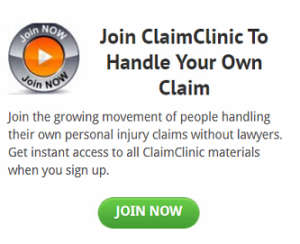Adjusters are not lawyers. They are people trained by insurance companies on how to investigate and evaluate claims. More importantly, they are also trained in subtle tactics for closing claims for the least amount of money possible.
Things You Can Do For Adjusters
You can and should talk to the adjuster if they call. You just need to make sure you only talk about certain subjects and defer the rest. During any phone conversations you have with adjusters you SHOULD:
- Write down the name, address, and phone number of the adjuster and his/her company;
- You can and should provide your full name, address, and phone number;
- Take notes during the conversation;
- Ask the adjuster if there are any witnesses to the accident that you don’t already know about;
- Only describe your injuries in a very general sense. Do not get specific because if you do, the insurance company can later say you are changing your story and lying. A good way to say it is something like, “My back, neck, and shoulders hurt. I am going to doctors right now and waiting for them to give me a diagnosis.”
Things Not To Do For Adjusters
- Do not give a recorded statement. This will only be used against you later on and there is no need to give the insurance company free information about your case. This is your case, your claim. You want to be in control of your case and the flow of information. If you have already given a statement, call the adjuster and request they send you a transcript of the statement so that you can read and know what you actually said to the adjuster.
- Do not make friendly conversation with the adjuster. Stay strictly business and only tell them your contact information, where the accident occurred, the date and time it occurred, and the type of accident it was.
- Absolutely do not agree to ANYTHING at this time.
- DO NOT SIGN ANYTHING. Insurance companies sometimes send checks and other forms that have release language “hidden” on them.
- Do not give any information about your family.
- Do not give the adjuster the names of your doctors. (See the next tip to see how to respond to this request)
- Do not sign a medical release (also called a HIPAA Release). Your medical records are protected by federal law. The insurance companies will send out very broad releases so that they can go gather all your medical records, even records from doctors that did not treat you for this accident.
The best way to respond to an adjuster who is asking for your doctors’ names or to get your records for themselves is to tell them you know how to handle and document your claim. Tell them you will be putting together a comprehensive Demand Package that will include all your medical records and bills for their review. Chances are the adjuster will first be surprised (that you know what you are doing and are acting like a personal injury attorney) and then appreciative that you are going to make their job easier.
There’s A Lot More About Adjusters Inside the ClaimClinic
The above tips are meant to help get you started and make sure you are not doing anything to hurt your case while you figure out how you are going to handle it. There is much more inside the ClaimClinic pertaining to adjusters, including:
- What an adjuster’s job description is and how they work. Knowing this can help you appeal to their interests in how the are paid and bonus’d by the insurance company.
- How adjusters work through whose fault the accident is.
- What adjusters look for in your medical records to either add or subtract value from your case.
- The software adjusters use to value your case and get offer ranges on your claim. Once you understand this, you will be well on your way to getting the maximum offer out of the adjuster.
- How to contact the adjuster to start the claim’s process if they haven’t already contacted you.
- Why you will normally have 2 different adjusters – 1 for your property damage claim and 1 for your personal injury claim.
- The difference between talking to the at-fault driver’s insurance adjuster and your insurance company’s adjuster (hint: duty to cooperate).
- Negotiation tactics adjusters use in claims.
Get Started Handling Your Own Injury Claim
ClaimClinic Pays For Itself
 We hope you enjoyed your tip for the day. ClaimClinic is chock-full of information on how to handle your own car accident claim. The critical modules that can result in ClaimClinic paying for itself are:
We hope you enjoyed your tip for the day. ClaimClinic is chock-full of information on how to handle your own car accident claim. The critical modules that can result in ClaimClinic paying for itself are:
- Documenting Your Claim – adjusters only consider evidence that is documented. If you don’t put forth the right documentation, you won’t get the best offer.
- Dissecting Medical Records – the biggest source of claim data for the adjuster is your medical records. Learn to pull out all the valuable information in your medical records and serve up your claim’s injuries and pain and suffering date to the adjuster.
- Writing Demand Letters – the Demand Letter is the single most important thing you will do in your claim. ClaimClinic will teach you a method to write your Demands, step-by-step, that will give the adjuster all the information in such a way to position your settlement for its highest value.
- Negotiations – learn adjuster tactics and how to respond to their offers.














